宾语从句之语序时态总结讲课讲稿
- 格式:doc
- 大小:35.50 KB
- 文档页数:6
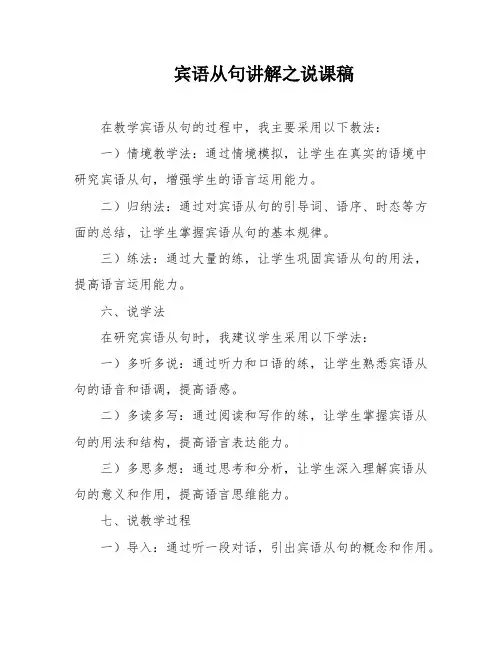
宾语从句讲解之说课稿在教学宾语从句的过程中,我主要采用以下教法:一)情境教学法:通过情境模拟,让学生在真实的语境中研究宾语从句,增强学生的语言运用能力。
二)归纳法:通过对宾语从句的引导词、语序、时态等方面的总结,让学生掌握宾语从句的基本规律。
三)练法:通过大量的练,让学生巩固宾语从句的用法,提高语言运用能力。
六、说学法在研究宾语从句时,我建议学生采用以下学法:一)多听多说:通过听力和口语的练,让学生熟悉宾语从句的语音和语调,提高语感。
二)多读多写:通过阅读和写作的练,让学生掌握宾语从句的用法和结构,提高语言表达能力。
三)多思多想:通过思考和分析,让学生深入理解宾语从句的意义和作用,提高语言思维能力。
七、说教学过程一)导入:通过听一段对话,引出宾语从句的概念和作用。
二)讲解:通过教师的讲解和举例,让学生了解宾语从句的引导词、语序、时态等方面的规律。
三)练:通过个人、小组和全班练,让学生巩固宾语从句的用法和结构。
四)拓展:通过听一篇短文和讨论,让学生深入了解宾语从句的实际运用和意义。
五)总结:通过教师的归纳和学生的总结,让学生掌握宾语从句的基本规律和用法。
八、说教学反思在教学过程中,我发现学生对宾语从句的理解和掌握程度有所不同,一些学生掌握得比较快,而一些学生则需要更多的练和指导。
因此,在今后的教学中,我将更加注重差异化教学,根据学生的不同情况采取不同的教学方法和策略,让每个学生都能够充分发挥自己的潜力。
同时,我也会不断反思和改进自己的教学方法,让教学更加科学、有效。
英语是一门培养学生逻辑思维能力和开阔视野的学科。
在教学过程中,我们要让学生“知其然”和“知其所以然”,并能够举一反三,由“学会”向“会学”转变。
在坚持“以学生为主体、以教师为主导”、“教学相长”、“寓教于乐”的原则的前提下,我们要结合初三年级学生的身心发展特点、认知特征和本讲内容的特点,主要采用讲授法,让学生获取丰富充实的课堂知识。
同时,考虑到初三年级的学生第一次系统性、理论性地研究宾语从句,我们在授课时将坚持“少而精”的原则,让学生深刻理解和掌握宾语从句。
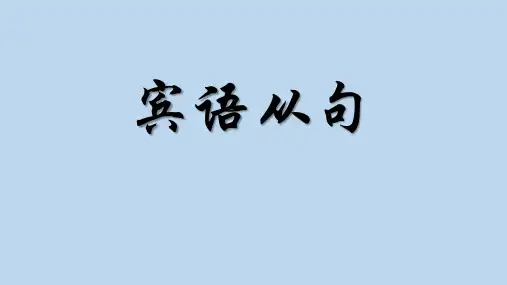
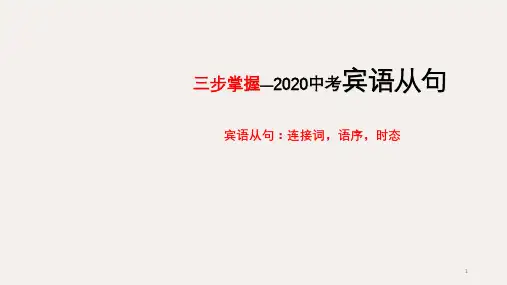
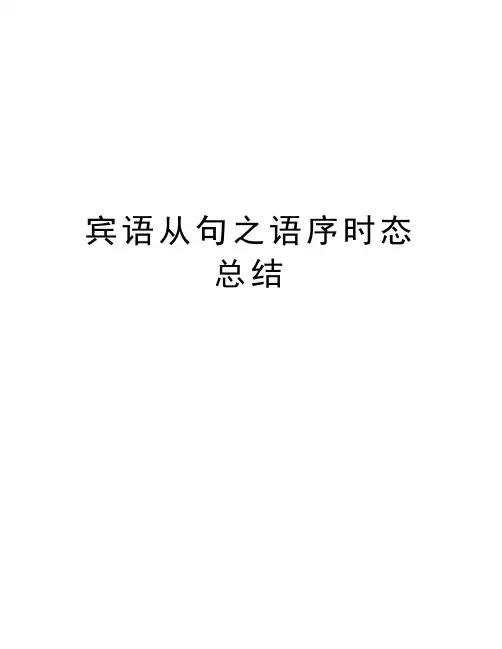
宾语从句之语序时态总结宾语从句Teaching Aims:让学生通过学习宾语从句,能正确做题,并能在交际及写作中正确运用。
Main and Difficult Point s:时态中的细化角度,以及含宾语从句的反意疑问句。
Analysis: 宾语从句在初中语法中是重点,中考选择题必有一道。
Teaching Procedure:1定义的角度:在复合句中充当宾语成分的句子叫宾语从句。
eg I know you. (主+谓+宾)I know(主+谓+宾语从句)2 从解题的角度:①语序的角度:从句总是要用陈述句的语序(主谓不倒装)What are they talking about ? I want to know.⇨I want to know what they are talking about.How can I get to the train station ? Can you tell me?⇨Can you tell me how I can get to the train station?②从时态的角度:a .如果主句是一般现在时,从句根据情况使用任何一种时态。
I know you are a teacher. (一般现在时)I know you were a teacher three years ago.(一般过去时)I know you will be a teacher next year. (一般将来时)(主现从任)b.如果主句是一般过去时,从句就要根据时间状语而用相应的过去的某种时态。
I heard you had a bad cold.(一般过去时)He asked me what I was doing last night (过去进行时)He told me that he had finished his homework last night.(过去完成)I knew you would be a teacher next year. (过去将来)(主过从过)c.如果从句是客观真理时,它永远都用一般现在时。
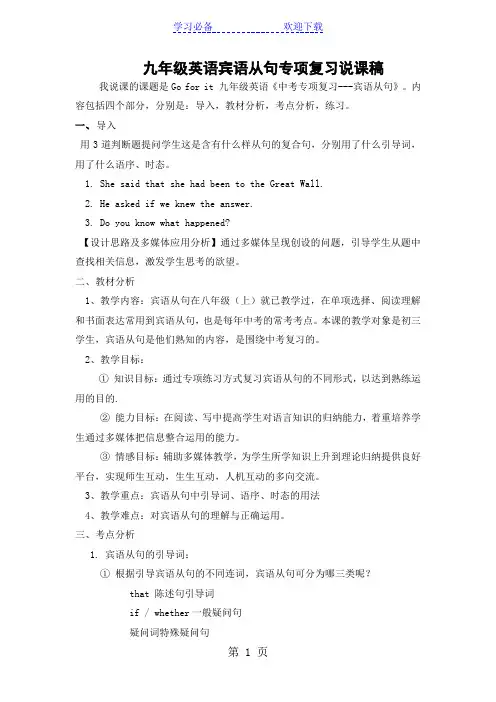
九年级英语宾语从句专项复习说课稿我说课的课题是Go for it 九年级英语《中考专项复习---宾语从句》。
内容包括四个部分,分别是:导入,教材分析,考点分析,练习。
一、导入用3道判断题提问学生这是含有什么样从句的复合句,分别用了什么引导词,用了什么语序、时态。
1. She said that she had been to the Great Wall.2. He asked if we knew the answer.3. Do you know what happened?【设计思路及多媒体应用分析】通过多媒体呈现创设的问题,引导学生从题中查找相关信息,激发学生思考的欲望。
二、教材分析1、教学内容:宾语从句在八年级(上)就已教学过,在单项选择、阅读理解和书面表达常用到宾语从句,也是每年中考的常考考点。
本课的教学对象是初三学生,宾语从句是他们熟知的内容,是围绕中考复习的。
2、教学目标:① 知识目标:通过专项练习方式复习宾语从句的不同形式,以达到熟练运用的目的.② 能力目标:在阅读、写中提高学生对语言知识的归纳能力,着重培养学生通过多媒体把信息整合运用的能力。
③ 情感目标:辅助多媒体教学,为学生所学知识上升到理论归纳提供良好平台,实现师生互动,生生互动,人机互动的多向交流。
3、教学重点:宾语从句中引导词、语序、时态的用法4、教学难点:对宾语从句的理解与正确运用。
三、考点分析1. 宾语从句的引导词:① 根据引导宾语从句的不同连词,宾语从句可分为哪三类呢?that 陈述句引导词if / whether一般疑问句疑问词特殊疑问句【多媒体应用分析】:可以增大课堂容量,优化课堂环节.② 呈现总结:如果宾语从句是由陈述句转换成的,用that引导;如果宾语从句由一般疑问句转换的用if / whether引导;如果宾语从句由特殊疑问句转换成的用疑问词。
【设计思路】采取分组合作学习方式,引导学生学会获取信息,加工信息的能力,加强学生合作与交流、自主学习的能力一般说来,“教师”概念之形成经历了十分漫长的历史。
![[宾语从句的时态及语序] 宾语从句的语序和时态](https://uimg.taocdn.com/34c7897d9e31433238689347.webp)
[宾语从句的时态及语序] 宾语从句的语序和时态宾语从句的时态及语序一.主句与从句时态一致问题(中考考点)1. 如果主句是现在的某种时态(包括一般现在时,现在进行时,现在完成时),那么宾语从句的时态课根据实际情况而定。
eg. I remember he gave me a book yesterday.2. 如果主句是过去的某种时态(包括一般过去时,过去进行时),那么宾语从句一般要用过去的某种时态(包括一般过去时,过去进行时,过去将来时,过去完成时)Eg.He told me that he would take part in the high jump.3. 但当宾语从句是指客观事实、普遍真理、自然现象时,则只能用一般现在时。
eg. She said (that) the sun rises in the east.三.宾语从句的语序(中考考点)宾语从句要用陈述句语序(中):—Do you know _D__ tomorrow?A. when did she comeB. when she cameC. when will she comeD.when she will comeA组习题1. — Do you know ____ tomorrow?—At 8 o”clock.A. when did she comeB. when she cameC. when will she comeD. when she will come2.We want to know _____to help them.A. what can we doB. what we can doC. how can we doD. how we can do3.1 didn”t see Laura at the party last night. Do you know_?A. why didn”t she comeB. what happenedC. when would she arriveD. where she has been4.— Excuse me, I want to go to the 21st National Book Expo (世博会). Could you tell me______?— Sure. It is at No. 3 Changjiang Road in Harbin.A. where it isB. where it wasC. where is it5. ----Could you tell us how long ?---- About three days.A. does the sports meeting lastB. the sports meeting will lastC. the sports meeting lastD. will the sports meeting last6.— Could you please tell me ?—Tomorrow morning.A. how I can get to the post officeB. how long can I keep the bookC. when to leave for BeijingD. where I should take the early bus7.—Do you know ___ Beijing with his family?—Next week.A. when Mr Zhao will visitB. when will Mr Zhao will visitC. when Mr Zhao visited8.Can you tell me_ ?A. where you are fromB. where you are fromC. where do you come from9. Do you know ___________?A. when will he be backB. when he will be backC. where did he goD. where will he go10.Allen wanted to know ____ after it got out of the UFO.A. what is the alien doingB. what the alien would doC. where would the alien goD. where the alien is going11.—Could you tell me ________ the party?—Next Friday.A. where we are going to haveB. when we are going to haveC. when we were going to have12.—I’m new here. Could you please tell me _______?—Sure. It’s over there behind that tower.A. where the youth centre isB. when the lipary opensC. how far is the amusement parkD. how can I get to the underground station13.I don”t know if she to my birthday party tomorrow. If she , I”ll be very happy.A. comes; comesB. will come; comesC. comes; will come14.—I don”t know_ .— You can go and ask Jack.A. when does the train leaveB. that we will plant trees or notC. if she had come yesterdayD. what I should buy for him15.—Mum, can we go to the art museum tomorrow?—Sure. But first we should find out ________.A. what can we doB. where we can goC. how can we go thereD. if it will be openB 组习题1.—Could you tell me _________?— You can take No. 16 bus.A. how can we get to the Olympic ParkB. how we can get to the Olympic ParkC. how did we get to the Olympic ParkD. how we got to the Olympic Park2.—Can you tell me how many colors ________ in a rainbow?—Seven.A. there areB. are thereC. they areD. are they3.—Could you tell me ?—He”s a bank clerk.A. who your father isB. what your father doesC. where your father works。
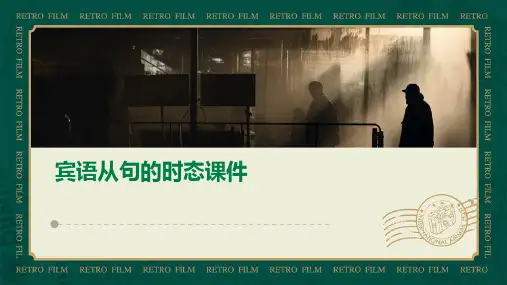
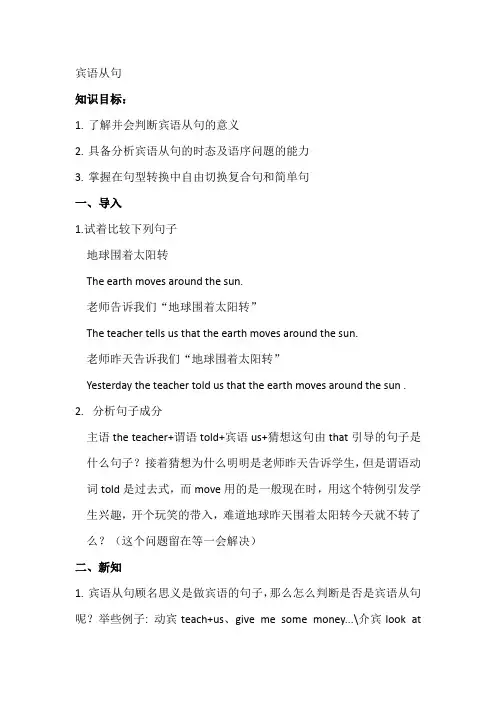

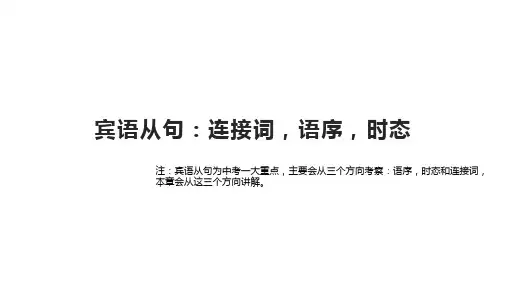
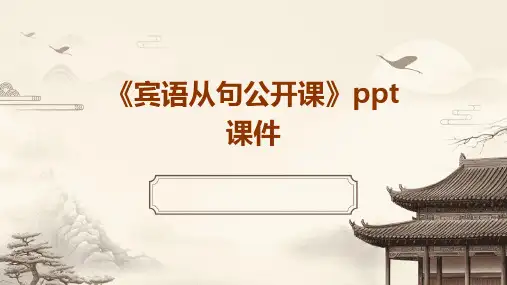
宾语从句中的时态和语序问题宾语从句是一个句子中作为宾语的从句,它常常由连接代词(如that、whether/if、who、whom、which、whose等)或连接副词(如when、where、why、how等)引导。
在宾语从句中,时态和语序是需要特别注意的问题。
本文将就这两个问题展开探讨。
一、时态问题1. 当主句的谓语动词是现在时(一般现在时、现在进行时、一般将来时)时,宾语从句通常保持不变,表示客观事实、普遍真理或者将来发生的事情。
例如:He said that he is a student.(他说他是一个学生。
)She wonders if they are coming to the party.(她想知道他们是否会来参加晚会。
)The teacher told us that the train will arrive at 8 a.m.(老师告诉我们火车会在上午八点到达。
)2. 当主句的谓语动词是过去时(一般过去时、过去进行时、过去将来时)时,宾语从句需根据具体情况改变时态。
若宾语从句中的动作或状态与主句谓语动词表示的时间关系相同,保持不变。
例如:She said that she was tired.(她说她很累。
)I asked him if he had finished his homework.(我问他是否完成了作业。
)若宾语从句中的动作或状态与主句谓语动词表示的时间关系不同,需进行相应的时态转换。
例如:He told me that he would come tomorrow.(他告诉我他明天会来。
)I wondered if he had received the email.(我想知道他是否收到了邮件。
)3. 当主句的谓语动词是过去完成时时,宾语从句中的谓语动词需使用过去完成时。
例如:She said that she had already eaten lunch.(她说她已经吃过午饭了。
宾语从句英语讲课逐字稿课程名称:宾语从句英语讲课逐字稿课程目标:1. 学生能够理解宾语从句的定义和结构。
2. 学生能够识别并构造不同类型的宾语从句。
3. 学生能够将宾语从句运用到实际的口语和书面表达中。
课程时长:45分钟教学过程:1. 导入(5分钟)- 通过一个简单的日常对话引入宾语从句的概念。
- 例如:"Do you know where the library is?"(你知道图书馆在哪里吗?)2. 宾语从句的定义(5分钟)- 解释宾语从句是作为动词或介词的宾语的从句。
- 强调宾语从句可以回答“谁”、“什么”、“哪里”、“何时”、“为什么”和“如何”等问题。
3. 宾语从句的结构(10分钟)- 展示宾语从句的基本结构:主句 + 连词 + 从句。
- 举例说明不同类型的连词:that, if, whether, who, what, where, when, why, how等。
- 通过填空练习让学生熟悉这些连词的使用。
4. 宾语从句的类型(10分钟)- 介绍宾语从句的三种类型:陈述句宾语从句、一般疑问句宾语从句和特殊疑问句宾语从句。
- 通过例句展示每种类型的结构和用法。
- 例如:- 陈述句宾语从句:I believe that he is honest.- 一般疑问句宾语从句:I wonder if you can help me.- 特殊疑问句宾语从句:I don't know where you live.5. 宾语从句的语序(5分钟)- 强调宾语从句必须使用陈述句语序,即使主句是疑问句。
- 通过对比练习让学生理解陈述句语序和疑问句语序的区别。
6. 宾语从句的时态(5分钟)- 解释宾语从句的时态通常与主句的时态保持一致。
- 通过时间线索图展示不同情况下的时态选择。
7. 互动练习(5分钟)- 分组让学生进行角色扮演,使用宾语从句构造对话。
- 每组选择一个场景,如购物、问路、讨论电影等。
宾语从句概念特征基本结构:主句(谓语动词/非谓语动词/介词/be+adj)+连接词(从属连词/连接代词/连接副词)+宾语从句宾语从句三要素1、引导词2、语序:陈述语序3、时态:主现从随便主过从必过真理永一现初级水平一、that 引导的宾语从句中,作动词的宾语时,that 可以省略,但是几个that 并列时不能省略He said (that) the meeting was very important and that we should attend it. 他说会议很重要并要求我们参加。
宾语从句中的时态特点:①如果主句是一般现在时,从句可以用它本身所需要的任何时态;本质:主句是一般现在时,说明说话者处于现在这个时间即此时此刻,那么宾语从句表述的是客观事实或事件,不受主句的影响而根据自身需要使用相应时态Tom says you will eat apple 将会吃苹果Tom says you eat apple 吃苹果Tom says you are eating apple 正在吃苹果Tom says you ate apple 曾经吃了苹果Tom says you have eaten apple 已经吃了苹果Tom says you had eaten apple 那时已经吃了苹果Tom says you would eat apple 原本打算吃苹果②如果主句不是一般现在时,主、从句时态上要一致而不是相同本质:当主句不是一般现在时,主句的时态决定了从句发生的时间节点,不然就会出现时空错乱和逻辑错误,所以从句时态要和主句时态连接在一起,保证正常时空逻辑顺序Tom said that you will eat apple主句是过去时从句是将来时直接跳过了现在这个时间导致时空错乱在老外的时空观念里过去不可能跳过现在直接到将来过去必须经过现在才能到将来所以就要加入过去将来这个时间节点Tom said that you would eat apple总结:过去时只可能和过去进行时过将来时过去完成时这些时态连接在一起当主句是一般过去时,从句变成相应的过去时即时态倒退一步③表示客观事实,真理的从句一般用现在时You can’t imagine how excited they were when they received these nice presents. 你想象不到当他们收到这么好的礼物时多么激动。
宾语从句Teaching Aims:让学生通过学习宾语从句,能正确做题,并能在交际及写作中正确运用。
Main and Difficult Point s:时态中的细化角度,以及含宾语从句的反意疑问句。
Analysis: 宾语从句在初中语法中是重点,中考选择题必有一道。
Teaching Procedure:1定义的角度:在复合句中充当宾语成分的句子叫宾语从句。
eg I know you. (主+谓+宾)I know(主+谓+宾语从句)2 从解题的角度:①语序的角度:从句总是要用陈述句的语序(主谓不倒装)What are they talking about ? I want to know.⇨I want to know what they are talking about.How can I get to the train station ? Can you tell me?⇨Can you tell me how I can get to the train station?②从时态的角度:a .如果主句是一般现在时,从句根据情况使用任何一种时态。
I know you are a teacher. (一般现在时)I know you were a teacher three years ago.(一般过去时)I know you will be a teacher next year. (一般将来时)(主现从任)b.如果主句是一般过去时,从句就要根据时间状语而用相应的过去的某种时态。
I heard you had a bad cold.(一般过去时)He asked me what I was doing last night (过去进行时)He told me that he had finished his homework last night.(过去完成)I knew you would be a teacher next year. (过去将来)(主过从过)c.如果从句是客观真理时,它永远都用一般现在时。
The teacher tells/told that the earth moves around the sun. (主任从现)注意:时态:十二字方针:主过从过,主现从任,主任从现⑶从连接词的角度:a 当陈述句变为宾语从句时,用that连接,而且that可省略You are a student. (改为宾语从句)I know (that) you are a student注意:that不可省略的情况1.宾语从句中的主语是that时Eg:She told me that that was a useful book.2.有多个宾语从句,第一个可以省略,其他不可以Eg: She said(that) the film was interesting and that she enjoyed seeing it.3.在主从复合句中(that引导的宾从中又含有从句时that 一般不省略)Eg : I'm afraid that if you lose the book you’ll pay for it.I think that if you study hard you will pass the test.4.主语和宾语之间有插入语时Eg: He told me ,believe it or not ,that he would buy a car.5.当it作形式宾语代替that引导的宾语从句时Eg: They make it clear to the public that they do an important job.b 当一般疑问句变为宾语从句时,用if 或whether连接.Are you a student? I wonder.⇨I wonder if /whether you are a student.Does he like learning English? Do you know?⇨Do you know if/whether he likes learning English?注意:下列情况一般用whether 不用if●后接or not 时只用whetherEg:I don’t know whether she will come or not.●引导从句作介词宾语时Eg: I am interested in whether you like English.I am worried about whether I hurt his feelings.We're thinking about whether we can finish the work on time●后接to 的不定式Eg: I’m uncertain whether to go or not●若用if会引起歧义时,则用whether.如:Please let me know if you like the book可理解为: Please let me know whether you like the book请告诉我你是否喜欢这本书。
If you like the book please let me know你如果喜欢这本书,请告诉我●whether置于句首时,不能换用if。
如:Whether this is true or not,I can't say.这是否真的我说不上来。
●引导主语从句和表语从句时宜用whether。
如:Whether she will come or not is still a question.她是否能来还是个问题。
The question is whether we can catch the bus.问题是我们能否赶上公共汽补充;只能用if不能用whether引导的宾语从句1.if引导条件状语从句,意为“如果”The students will go on a picnic if it is sunny.2.if引导否定概念的宾语从句时He asked if I didn’t come to school yesterday.3.引导状语从句even if(即使)和as if(好象)时Eg :He talks as if he has known all about it.c 当特殊疑问句变为宾语从句时,用疑问词作连接词(即保留疑问词不变);常见疑问词包括疑问代词( what ,who ,which, whom, whose)和疑问副词(when , where ,how, why)Where are you going? I don’t know.I don’t know where you are going.连接代词:who ,whom, whose ,which ,what,在句中担任主语、宾语、定语或者表语。
Do you know who has won Red Alert game?The book will show you what the best CEOs should know.Have you determined which you should buy ,a Motorola or Nokia cell phone?连接副词有:when, where ,why ,how,在句中担任状语的成分。
He didn’t tell me when we should meet again.Could you please tell me how you use the new panel?None of us knows where these new parts can be bought.注意:语序为陈述语序附加1祈使句变为非谓语:“Don’t play football in the street,” teacher said.(变为一个句子)Teacher told us not to play football in the street.祈使句转换成一个句子往往用固定句型:tell/ask sb. (not) to do sth.附加2含宾语从句的反意疑问句a 一般情况下,反意疑问句部分的主谓跟主句保持一致。
He thinks that you are a good man, doesn’t he?b .当主句的主语是第一人称“I”时,反意疑问部分的主谓应跟从句保持一致I think that you are a good man, aren’t you?c .当主句的谓语动词是think believe suppose expect等表示“认为,想法”的动词时,常有否定转移,即用否定主句来实现对从句的否定,所以,要注意否定转移时的反意疑问句。
I don’t think that you are a good student, are you ?I don’t believe that man is killed by Jim ,is he?We suppose you have finished the project, haven't you?I expect our English teacher will be back this weekend, won't she/he?另外,如果宾语从句中有某个含有否定意义的形容词或副词(不包含带有否定前缀的词,如:unhappy,unfair,dislike等相当于肯定,后面反疑问句用否定,如Tom is unhappy today ,isn’t he?),其反义疑问句要用肯定形式.We find that he never/hardly listens to the teacher carefully, does he?附加3:宾语从句中的陷阱题(容易出错的题)1.Could you tell me___________?A when you will send the fridge to our houseB when will you send the fridge to our houseC when you would send the fridge to our houseD when would you send the fridge to our house正确答案为A。
很多同学看到could,就认为主句是过去时态,所以选了C。
实际上could you tell me (你能告诉我吗)表示的是一种委婉的语气,而不是过去时态!2. He asked me____________?A what was the wrongB what the wrong wasC what the wrong isD what is the wrong正确答案是A 。